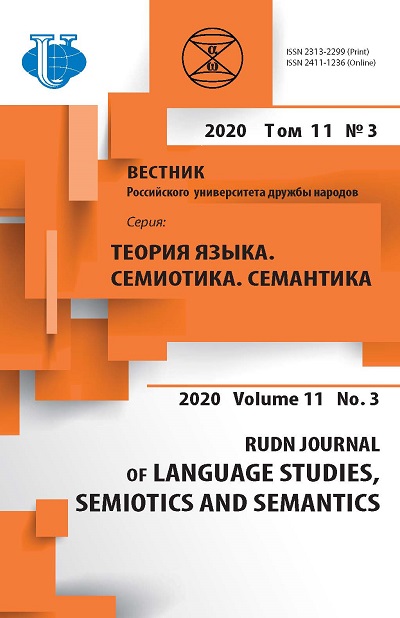Analysis of Country Specific Terminological Units in Economics from English Sources
- Authors: Kalugina J.E.1
-
Affiliations:
- Lomonosov Mosow State University
- Issue: Vol 11, No 3 (2020)
- Pages: 517-531
- Section: COGNITIVE STUDIES IN LANGUAGE
- URL: https://journals.rudn.ru/semiotics-semantics/article/view/24603
- DOI: https://doi.org/10.22363/2313-2299-2020-11-3-517-531
- ID: 24603
Cite item
Full Text
Abstract
This research aims to investigate the way different unique cultural phenomena are reflected in the English financial and economic terminology. By using the special lexicographical sources, contemporary books and publications on economics, we choose three most representative groups of metaphors built on colorful and easy recognizable features of an individual culture such as national symbols, ethnic names and cuisines. First, this study examines various terminological units drawing on metaphors in terms of their semantics and structure. Second, we analyze their potential for term-building modeling. The results show that in the English professional language nationally marked metaphors become increasingly popular. They have an advantage to evoke strong associations and thus to create motivation base for a term. The latter is of paramount importance from pragmatic perspective since any term is designed to serve as a useful tool of an expert. Our findings also suggest that the process of term-building in the English financial and economic language is typically based on existing models. This provides another clear practical advantage to facilitate international communication.
About the authors
Julia E. Kalugina
Lomonosov Mosow State University
Author for correspondence.
Email: jkalugina@econ.msu.ru
Ph.D. in Linguistics, Assistant Professor, Department of Foreign Languages at Faculty of Economics
1, Leninskie Gory str., Moscow, Russian Federation, 119991References
- Gvishiani, N.B. (2008). Language for academic communication: Methodology Issues. Moscow: Publishing House LKI. (In Russ.).
- Lakoff Jeorg, Jonson Mark (2004). Metaphors we live by. Trans. from Eng. — M: Editirial Urss. (In Russ.).
- Maslova, V.A. (2008). Modern trends in linguistics. Moscow: Publishing House “Akademia”. (In Russ.).
- Fedorov, B.G. (2006). New English-Russian Banking and Economic Dictionary. St. Peterburg: “Limbus Press”.
- Sorokina, E.A. (2007). Cognitive aspect of lexical design (to the basics of cognitive terminology). Author’s Abstract of Doctorate Thesis. Moscow. (In Russ.).
- Shakhovsky, V.I. (2008). Categorization of emotions in lexicological and semantic system of a language. Moscow: Publishing House LKI. (In Russ.).
- Volodina. M.N. (1998). Cognitive and informational nature of a term and terminological nomination. Doctorate Thesis. Moscow. (In Russ.).
- R.W. Holder. Oxford Dictionary of Euphemisms/ 4th Edition. — Oxford University Press, 2008.
- V. Faekov. (2011). New Financial Dictionary. English-Russian Dictionary (Vol. 1) / 2nd Edition. Moscow: International Relations Publishing House.
- Ter-Minasova, S.G. (2007). War and peace between languages and cultures. Moscow: «Publishing House Astrel». (In Russ.).
- Kornilov, O.A. (2003). Linguistic world views as a function of national mind-sets. Moscow: CeRo. (In Russ.).
- Oxford English Dictionary. Second Edition on CD-ROM (v. 4.0.0.3). Oxford University Press, 2009.
- Kalmykova, N. М. “Sandwich Generation” in the context of population aging: the need for an interdisciplinary approach // Innovative development of the Russian economy: Interdisciplinary interaction. The 7th International Scientific Conference; Moscow, Lomonosov Moscow State University, Department of Economics; April 16—18, 2014. Conference proceedings. Moscow: Prospect, 2014. pp. 567—571. (In Russ.).
- Molchanova, G.G. (2013). Tradions of Gastics as a reflection of ethnical and regional identities. “Bulletin of Moscow State University. Series: Linguistics and cross-cultural communication”. 2013 / № 2. pp. 20—26. (In Russ.).
- Grinev-Grinevich, S.V., Sorokina, E.A., Skopuk, T.G. (2008). Basis of Antropolinguistics. Moscow: Publishing House “Akademia”. (In Russ.).
Supplementary files












